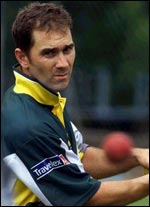Unjust on Justin
Daniel Laidlaw
The dropping of Australian No. 3 batsman Justin Langer for the first Test
against England came as a surprise. It is not that Langer's recent Test
record necessarily made his omission unjust in a team with intense
competition for places, nor that Damien Martyn did not deserve to be
selected, but rather because it is a significant departure from usual
Australian selection policy.
 There is a saying that it is harder to be dropped from the Australian team
than it is to be selected in the first place. While that has certainly never
held true for bowlers, for batsmen, especially the established ones like
Langer, it has often been appropriate. A commendable hallmark of Australia's
cricket has been the selectors' willingness to show faith in the incumbent
batsmen. Throughout the winning streak only one change was made to the
batting line-up for reasons of form.
There is a saying that it is harder to be dropped from the Australian team
than it is to be selected in the first place. While that has certainly never
held true for bowlers, for batsmen, especially the established ones like
Langer, it has often been appropriate. A commendable hallmark of Australia's
cricket has been the selectors' willingness to show faith in the incumbent
batsmen. Throughout the winning streak only one change was made to the
batting line-up for reasons of form.
With a loss, however, patience is tested and stricter standards are
invariably applied. Unexpected defeat at the hands of India suddenly put the
under-performing players on notice. Whereas the relative dry run of Slater,
Langer and Mark Waugh could be carried in victory, defeat inevitably
prompted closer scrutiny.
Still, these were the batsmen part of a period of unprecedented prosperity -
Langer scored more runs during Australia's winning sequence than anyone else
- and a little faith was only fair. Despite Martyn's outstanding form as a
reserve and Langer's poor lead-up scores in the limited preparation time
ahead of the Ashes - unavoidably limited preparation since Langer was not
part of the one-day squad - no changes were expected.
Something, however, did change - Langer was dropped for Martyn, a severe
blow for the committed No. 3. While it is easy to understand the eagerness
to get Martyn into the team, it is difficult to reconcile the reasons for
Langer's dismissal. His recent Test form, while ordinary, has not been
especially poor. Langer has not scored a century in the past two series,
comprising 8 Tests, but had four during Australia's winning streak.
In his last series, in India, Langer appeared exceedingly vulnerable against
the off-spin of Harbhajan Singh and recklessly attacked as a means of
survival. It yielded a poor return, but given that English conditions are
vastly different and England possess no-one of Harbhajan's ilk, it would be
illogical to drop him on the basis of that series alone.
Most likely the reasons extend further back, to the five-Test home series
against West Indies, against a type of attack that was not dissimilar to the
one England will feature. Against uniform pace bowling that should have been
suited to his batting, Langer could only manage 203 runs at 25.38,
undoubtedly a bad series that belatedly seems to have condemned him.
However, Langer is far from the only Australian batsman short of meaningful
runs for a series or more.
Since the start of Australia's streak, Langer has made 1316 runs at 47, with
four hundreds. In the same period, Mark Waugh has scored 1010 runs at 40.40
with two hundreds. Somebody must be awarding style points. Recent history is
less kind, as across the last two series Langer has 364 runs at 28 compared
to Waugh's 488 at 40.67, but judging players on such records is an arbitrary
exercise.
So, if not judged on Test form, perhaps the warning that players had to
perform in the tour matches was indeed serious. If so, does that mean Hayden
and Slater were also under threat of being axed were it not for
half-centuries in their last first-class innings? Either tour match form
counts or it doesn't - it's patently unfair to discriminate by using by
using Langer's form against him while ignoring Mark Waugh's.
Langer has struggled badly for scores of 4, 0, 0 and a decisively scratchy
17 off 71 balls against Essex in a match in which all other batsmen except
Mark Waugh made fluent half-centuries. In Waugh's only two first-class
innings since the one-day series, he made 25 and 0. Maybe a dead tour match
against Essex carried more import than we thought. Would Langer still have
been dropped had he peeled off a hundred on a meaningless final day against
a depleted Essex attack? If not, then there is something wrong with the
criteria being used.
Langer, it seems, has been unfairly singled out. It's especially surprising
considering he has long been a favourite of Waugh and is a Western
Australian team-mate of Gilchrist, the only selectors on tour. It would
appear that word came down from Australia's chairman of selectors, Trevor
Hohns, that Damien Martyn had to be included, thus removing the burden of
dropping a mate from the shoulders of tour selectors Waugh and Gilchrist.
The only man Martyn could logically replace was Langer.
 Langer's axing also represents a significant moment in Ricky Ponting's
career. Ponting's brief tenure at No. 3 as David Boon's immediate successor
was harshly terminated more than four years ago when, after just two Tests
against the West Indies, he was inexplicably dropped. The mixed signals that
sent to the naturally aggressive Ponting unnecessarily held him back, until
he returned on the Ashes tour the following year at No. 6, where he has
since played the rest of his Test cricket.
Langer's axing also represents a significant moment in Ricky Ponting's
career. Ponting's brief tenure at No. 3 as David Boon's immediate successor
was harshly terminated more than four years ago when, after just two Tests
against the West Indies, he was inexplicably dropped. The mixed signals that
sent to the naturally aggressive Ponting unnecessarily held him back, until
he returned on the Ashes tour the following year at No. 6, where he has
since played the rest of his Test cricket.
The immediate benefit of Langer's omission is two-fold, as in addition to
clearing a middle order place for Martyn, it also solidifies Australia's
precarious top order as Ponting inherits the influential No. 3 spot. With
Langer out of form and Slater and Hayden similarly unconvincing, there was a
danger of Australia's middle order being exposed, like it dramatically was
four years ago when Gough and Caddick reduced Australia to 54/8 on the
opening morning of the Ashes. The promotion of the in-form Ponting to his
corresponding one-day position, where he can begin his innings against pace,
does much to stabilise the top order, at least on paper.
It had appeared that Ponting would gradually ascend as the Waughs retired,
but climb no higher than No. 4 while Langer remained the incumbent
first-drop. Now, the sudden elevation to No. 3 could be just the challenge
he needs to re-launch his Test career with a flourish.
For Justin Langer, his dropping is possibly a career-ending blow. Realising
the folly of past mistakes, the selectors are likely to grant Ponting much
latitude, should he need it, to succeed at No. 3. Martyn, in the middle
order, is unlikely to relinquish his desperately hard won place in a
champion team, and after having thoroughly earned it, indeed does not
deserve to do so.
At 30 years old, having been dropped twice before and with 25-year-old
Western Australian team-mate Katich also awaiting selection, it is difficult
to envision Langer ever returning. He has played Australia's last 33 Tests
and been a valuable member in that time, with 2305 runs at 42.69, including
all 7 of his career centuries. Unless there is an unforseen turn of events,
the Test career of this dedicated batsman appears over.
More Columns
Mail Daniel Laidlaw